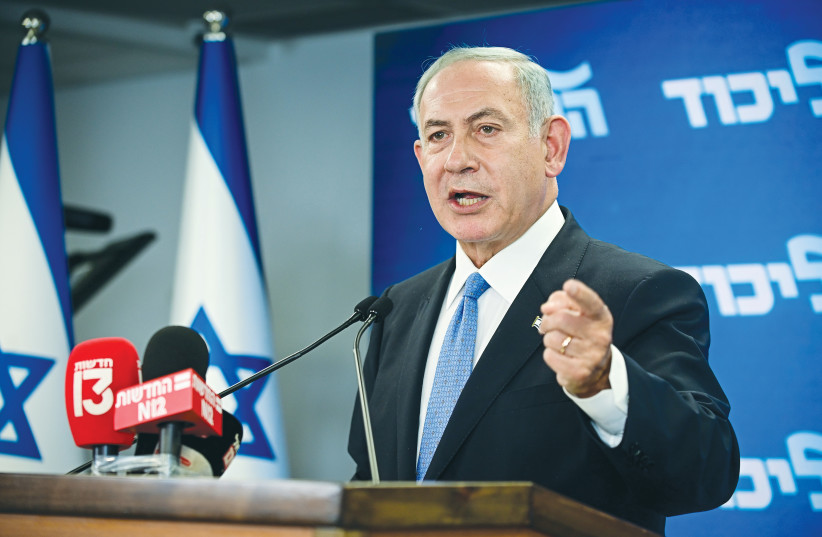Conventional wisdom regarding the potential impact of the election on the public corruption trial of former prime minister Benjamin Netanyahu ranges from it being abruptly canceled to having it rush forward with a certain conviction.
These zero-sum extreme scenarios are likely mistaken; the impact of the election on the trial will likely be at a much more nuanced level.
Netanyahu’s critics are terrified that if he gets his 61-seat right-wing government, he will pass a law to end the trial or fire the attorney-general and appoint a new one who will do so.
Many of his supporters are terrified that if he does not win the election, then he will inevitably be convicted of bribery, ending his long and storied political career in prison.
His critics can rest easier: Even if Netanyahu becomes prime minister again, there is almost zero chance that his trial will be canceled.

First, there are moderate members of his Likud Party who will probably not vote for canceling the trial, and it would probably only take one vote to block such an aggressive move.
Second, the High Court of Justice would never let such a move get through.
So in order to pass such a law, Netanyahu would need to go bigger than big in a constitutional crisis with the High Court.
Yes, some in the Religious Zionist Party would relish such a fight, but an even larger number of Likud MKs would not.
He also probably cannot succeed at firing the attorney-general.
A previous High Court decision solidified his commitment not to deal with major legal decisions that could impact his trial.
There is no way the High Court would let him fire his attorney-general while his trial is still on, absent some kind of currently nonexistent personal scandal for Gali Baharav-Miara.
And Netanyahu himself is unlikely to want to do so.
Canceling the trial would convince segments of the country who are on the fence of his guilt and could lead to another election with his standing permanently weakened.
Plus, Netanyahu has sounded more confident about his trial since state’s witness Shlomo Filber surprised the prosecution with significant testimony helpful to his former boss.
Why call off a trial that he thinks he will win?
CONVERSELY, those who think Netanyahu will soon be convicted of bribery and gone from politics if he does not reclaim power are reaching.
There is a reason that former attorney-general Avichai Mandelblit almost cut a plea deal with Netanyahu in January that would have dropped the most serious bribery charges and settled for low-grade convictions for breach of public trust.
The prosecution’s case has not gone as planned.
Filber did not merely add testimony that was helpful to Netanyahu when he was supposed to be sinking him, he and the prosecution were also blindsided by the defense proving that a key Netanyahu-Filber meeting could not have taken place when they claimed.
Although the prosecution regrouped and gave a plausible narrative for other dates when the key alleged scheming meeting could have taken place, criminal cases are not won by “the plausible” but by proving all key points beyond any reasonable doubt.
In real time, a rank-and-file revolt of the prosecution team prevented Mandelblit from cutting a deal, but The Jerusalem Post understands that he believes this was an error.
This means that after all of the talk that Netanyahu is corrupt and would be convicted if only justice is allowed to go forward in the regular course, he may just be outright acquitted because of mixed evidence.
After deconstructing the extreme scenarios on both ends, the truth is that whether Netanyahu retakes power or not, there is a good chance he will end up being acquitted of the serious bribery charge and convicted only of lower-grade breach of public trust.
Because of that potential reality, there is also a strong chance that the plea deal will come back at some point, and this time, the prosecutors may be more amenable.
If the election has a concrete impact, it is likely to be more on the question of who has an advantage in plea-bargain negotiations.
Should Netanyahu fail to retake power, and it seems that he will not in the near future, he may finally be ready to accept a finding of moral turpitude and retire from politics as long as there is no jail time.
In contrast, if he gets back in the prime minister’s chair, the prosecution may be more likely to approve a deal where he accepts one or more minor convictions while dropping the moral-turpitude issue to avoid a constitutional crisis.
And, of course, the other possibility is that the election will have no impact. Both the prosecution and Netanyahu may be so (overly) confident that they may not want to budge, and the trial will just continue with a surprise ending for one of the sides.
